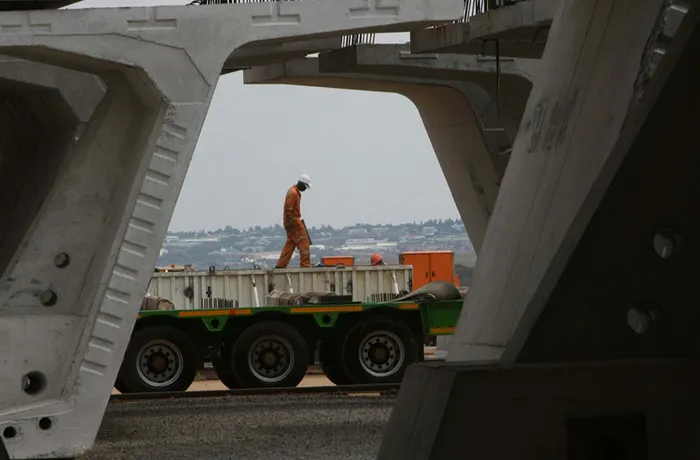Civil contractors get bargaining body

074 At the depo where most of the concrete structures are build and then assembled in the tunnel. Organisers of the Gautrain are confedent that athey are on schedule and folowing all the relevent laws and restrictions. Picture: Mujahid Safodien 074 At the depo where most of the concrete structures are build and then assembled in the tunnel. Organisers of the Gautrain are confedent that athey are on schedule and folowing all the relevent laws and restrictions. Picture: Mujahid Safodien
Roy Cokayne
The department of Labour has approved a bargaining council for the civil engineering industry, which will lead to standardised conditions of employment for all employees as well as equality and reduced wage differentials in the industry, among other things.
The founding applicants are the SA Federation of Civil Engineering Contractors (Safcec) as the national registered employers’ organisation, the National Union of Mineworkers and the Building, Construction and Allied Workers Union.
Annelie Gildenhuys, Safcec’s employee and labour relations executive, said that given recent unprecedented labour-related challenges, the industry would have to accept that traditional platforms and structures of wage negotiations had become dysfunctional.
She said the new bargaining council would give all parties an opportunity to proactively address the industry’s challenges in a positive manner.
Gildenhuys said the establishment of a bargaining council in terms of the Labour Relations Act was in the interests of parity and equity and had been a long-standing desire of Safcec and its members.
It was envisaged that the council would provide an institutionalised platform for bargaining and collective agreements suited to the industry.
Gildenhuys said the most important benefits of a bargaining council for civil engineering contractors were that it would standardise conditions of employment for all employers and employees, resulting in equality and reduced wage differentials at industry levels; provide for an organised forum for important issues as a form of self governance; and facilitate stability in the industry through longer-term collective agreements. This would pre-empt indiscriminate recourse to industrial action and allow contractors to focus on business matters.
However, Gildenhuys said the diversity of regional constituencies, low productivity and other socio-economic and political factors remained a concern and a comprehensive dialogue with all parties and stakeholders in the industry was essential.
“We believe the bargaining council for the civil engineering industry would be able to facilitate dignified labour relations in the industry.
“Despite the complexities, all parties, labour and employers alike, have to promote order and honour agreements and structures.
“Creative ways of establishing the structures and boundaries will have to be looked at to maintain a high level of security and a voice for all,” she said.
Gildenhuys stressed the bargaining council would facilitate principles of sound and equitable labour relations essential for the well-being of employees and employers in the industry with the concept of industrial peace enhanced through the standardisation of wages and benefits between industry employers through the industry bargaining council.